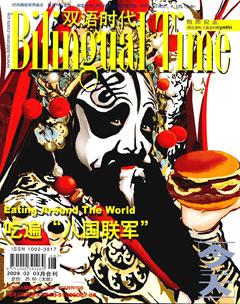健康饮食六大规则
Michael Pollan
Don't eat anything your great-great-great grandmother wouldn't recognize as food. Imagine how baffled your ancestors would be in a modern supermarket: the epoxy-like tubes of Go-Gurt, the preternaturally fresh Twinkies, the vaguely pharmaceutical Vitamin Water. Those aren't foods, quite; they're food products. History suggests you might want to wait a few decades or so before adding such novelties to your diet, the substitution of margarine for butter being the classic case in point. My mother used to predict "they" would eventually discover that butter was better for you. She was right: the trans-fatty margarine is killing us. Eat food, not food products.
你太祖母不认可的食物可千万别吃。想象一下,要是你的祖辈们在一家现代超市里,他们将会多么地困惑:像环氧树脂一样的管装Go-Gurt乳酪食品,奇异的新鲜夹心面包Twinkies,配药不明的维他命水。那些完全不是食物,但它们属于食物产品。历史表明你也许希望再等大约几十年才将这些新奇物品纳入你的日常饮食当中,黄油的替代品人造黄油就是一个典型的例子。我母亲曾预言“那些人”最终会发现还是黄油更适合。她是对的:反式脂肪人造黄油正置我们于死地。选择食物吧,回避食物产品。
Avoid foods containing high-fructose corn syrup (HFCS). It's not just in cereals and soft drinks but also in ketchup and bologna, baked goods, soups and salad dressings. Though HFCS was not part of the human diet until 1975, each of us now consumes more than 40 lbs. a year, some 200 calories a day. Is HFCS any worse for you than sugar? Probably not, but by avoiding it you'll avoid thousands of empty calories and perhaps even more important, cut out highly processed foods - the ones that contain the most sugar, fat and salt. Besides, what chef uses high-fructose corn syrup? Not one. It's found only in the pantry of the food scientist, and that's not who you want cooking your meals.
避开含高果糖浆(HFCS)的食物。不只是谷物和软饮含有这种物质,番茄酱和大腊肠、烘焙食物、羹汤和沙拉酱都含有HFCS。虽然直到1975年HFCS才成为人类日常饮食当中的一部分,现在我们每人每年消耗的HFCS都超过40磅,平均每天约耗200卡热量。与糖相比,HFCS是不是对你更不利?可能不会,但是避开HFCS的同时,你也避开了大量无营养卡路里,或许更重要的是,你还放弃了高度加工食品——那些高糖高盐高脂肪的食品。此外,什么样的厨师才会用HFCS呢?没人用。只有在食品科学家的食品柜里才会有HFCS,他可不是你想找来为自己做饭的人。
Spend more, eat less. Americans are as addicted to cheap food as we are to cheap oil. We spend only 9.7% of our income on food, a smaller share than any other nation. Is it a coincidence we spend a larger percentage than any other on health care (16%)? All this "cheap food" is making us fat and sick. It's also bad for the health of the environment. The higher the quality of the food you eat, the more nutritious it is and the less of it you'll need to feel satisfied.
多花点,少吃点。美国人热衷廉价食品就如我们热衷廉价汽油一样。我们在食物上的花费仅占收入的9.7%,这个份额比其他国家的都要少。这是否与我们在卫生保健方面的花费比例(16%)比其他国家的都要大是个巧合呢?所有这种“廉价食品”使我们肥胖、身体感到不适。同时它也不利于环境卫生。食物的质量越高,其营养价值就越高,你需要用来满足自己身体需求的食物份量就越少。
Pay no heed to nutritional science or the health claims on packages. It was science that told us margarine made from trans fats is better for us than butter made from cow's milk. The more I learn about the science of nutrition, the less certain I am that we've learned anything important about food that our ancestors didn't know. Consider that the healthiest foods in the supermarket - the fresh produce - are the ones that don't make FDA-approved health claims, which typically festoon the packages of the most highly processed foods. When Whole Grain Lucky Charms show up in the cereal aisle, it's time to stop paying attention to health claims.
别理会营养学或包装袋上的健康声明。正是科学告诉我们由反式脂肪制成的人造黄油比从牛奶中提炼出的黄油更有利于我们的健康。我对营养学了解得越多,就越不确定我们学到了什么祖先不知道的关于食物的重要知识。想想超市里最健康的食物吧,那些新鲜产品,可是通常不会包装花哨并且利用食品药品管理局批准的健康声明作宣传哦。当全谷物的Lucky Charm出现在谷物食物过道里时,就该别再理会健康声明了。(注:Lucky Charms是一个食品牌子,生产麦片,但是并不健康。)
Shop at the farmers' market. You'll begin to eat foods in season, when they are at the peak of their nutritional value and flavor, and you'll cook, because you won't find anything processed or microwavable. You'll also be supporting farmers in your community, helping defend the countryside from sprawl, saving oil by eating food produced nearby and teaching your children that a carrot is a root, not a machine-lathed orange bullet that comes in a plastic bag. A lot more is going on at the farmers' market than the exchange of money for food.
去农贸市场买东西。你将开始食用应季的食物,应季食物营养价值最高,味道最鲜美,你需要烹煮它们,因为你找不到任何加工好了的或只需用微波炉加热便可以吃的食物。同时你也在支持所在社区的农民,帮助捍卫农村,抗议城市的扩展,食用附近出产的食物以节省汽油,教育你的孩子胡萝卜是茎块类蔬菜,而不是机器生产的来自塑料袋里的橙色子弹。在农贸市场进行的不只是钱币换取食物这样一个行为,其中意义甚多。
How you eat is as important as what you eat. Americans are fixated on nutrients, good and bad, while the French and Italians focus on the whole eating experience. The lesson of the "French paradox" is you can eat all kinds of supposedly toxic substances (triple cream cheese, foie gras) as long as you follow your culture's (i.e., mother's) rules: eat moderate portions, don't go for seconds or snacks between meals, never eat alone. But perhaps most important, eat with pleasure, because eating with anxiety leads to poor digestion and bingeing. There is no French paradox, really, only an American paradox: a notably unhealthy people obsessed with the idea of eating healthily. So, relax. Eat Food. And savor it.
怎样吃和你吃什么同样重要。美国人非常倚赖营养品,不管是好的还是坏的,而法国人和意大利人则看重吃的过程。“法国悖论”的经验结果是你可以吃所有被认为有毒的物质(三重奶油乳酪、鹅肝酱),只要你遵循你的文化的(也就是你母亲的)规则:食量适度,两餐之间不吃另一餐或点心,永远不要单独用餐。但也许最重要的是应带着愉悦的心情进食,因为焦虑不安地进食会导致消化不良和暴饮暴食。其实,没有法国悖论,真的,只有美国悖论:一个极不健康的人才会痴迷健康饮食的法子。所以,放松,吃东西,享受食物。
Links
1.HFCS
高果糖浆,亦称果葡糖浆或葡萄糖异构糖浆,是以酶法糖化淀粉所得到的糖化液经葡萄糖异构酶的异构作用,将一部分葡萄糖异构成果糖,由葡萄糖和果糖组成的一种混合糖浆。果葡糖浆亦特指果糖含量较低的混合糖浆。有研究者提出高果糖浆可能导致新陈代谢紊乱,使人罹患心脏病和糖尿病的机率增加。指出高果糖浆的化学结构会刺激食欲,可能使肝脏将更多的威胁心脏安全的甘油三酯输出到血液中。另外,果糖可抑制体内的微量元素铬,而正三价的铬在维持血糖、胰岛素和胆固醇的正常水平上起重要的作用。
2.Spend more, eat less
多花点,少吃点。这句话是说你多花点钱买质量更好的食物,质量好的食物营养价值就更高,这样就不用吃太多次等的食物来满足身体对营养物质的需求。

